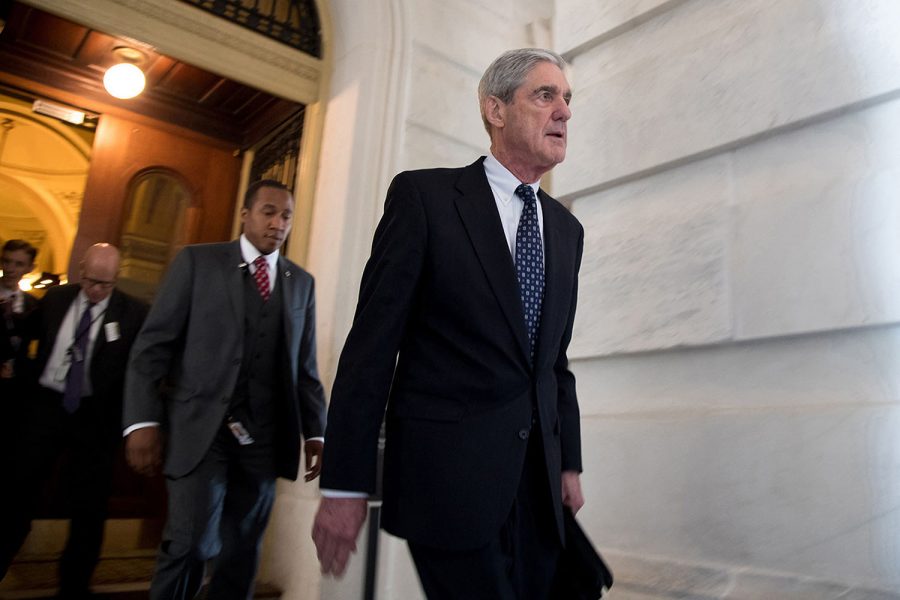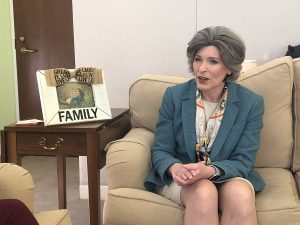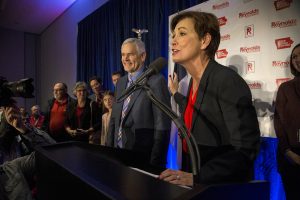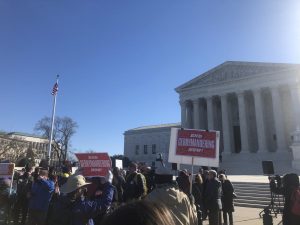Iowa’s congressional delegation: Remember Russia interfered with 2016 election
Those representing Iowa in Congress agree Americans should be wary of the threat of Russia following Robert Mueller’s investigation into collusion between the Trump campaign and Russia in the 2016 election.
Former FBI Director Robert Mueller, front, the special counsel probing Russian interference in the 2016 U.S. election, leaves the Capitol building after meeting with the Senate Judiciary Committee on Capitol Hill on June 21, 2017, in Washington, D.C. (Ting Shen/Xinhua/Zuma Press/TNS)
March 28, 2019
WASHINGTON — Iowa’s congressional delegation says Russia remains a threat to American institutions, and the members will focus on protecting the U.S. from the “hostile nation” following the conclusion of Special Counsel Robert Mueller’s investigation into any connection between the Trump campaign and his associates with Russia to influence the outcome of the 2016 election.
Mueller submitted a report on the nearly two-year-long investigation to Attorney General William Barr on March 22, drawing swift calls from Congress for the report to be made public to fully assess its content and how President Trump is implicated in the investigation.
Trump has characterized the investigation as the “Russian collusion delusion” — the report found no evidence of conspiracy by Trump or Trump associates. Iowans in Congress from both major political parties said they think the focus in the post-Mueller investigation world should shift from questioning whether Trump is implicated to contemplating how to protect American institutions from “bad actors” such as Russia.
Sen. Chuck Grassley, R-Iowa, the former Senate Judiciary Committee chairman, said Russia’s goal is to tear U.S. social cohesion, dating back to the Soviet system of spreading misinformation.
“Now … people have difference of opinion, but they aren’t violent,” he said. “I think that anything that people that don’t like — democracies can do to cause us trouble, they’re willing to do it.”
Sen. Joni Ernst, R-Iowa, a member of the Judiciary Committee, said she believes in the finding that there was no conspiracy but said Americans “absolutely” know Russia is a threat.
“… Russia is a bad actor, and we need to figure out how we protect ourselves against Russia,” she said.
Ernst and Grassley urged caution in determining which details of the Mueller report to make available to the public to protect informers who aided in the investigation, but they agreed that the report should be available to taxpayers.
Members of Iowa’s delegation said the release of the report would help the public move on and turn attention elsewhere. While the investigation took a long time to complete — 22 months — they said they felt it was worthwhile.
Rep. Cindy Axne, D-Iowa, said the Mueller report is not something that should just be condensed into a four-page document for consumption, pointing to the House’s unanimous support of a resolution calling for the report to be made available to the public.
“I think the House was on point when every single one of us voted to make sure that the Mueller report was made public,” she said.
Rep. Dave Loebsack, D-Iowa, said he does not know to what extent Russians interfered with the election, but he knows they did, and he wants to see the report to learn more.
“I hope that in all of this we don’t forget that the Russians, for God’s sakes, did interfere in our election process,” Loebsack said. “… We can’t allow that to happen any longer.”
Loebsack and Ernst said they want Congress continue to work on building infrastructure to withstand threats to U.S. cybersecurity and the electric grid. Ernst proposed that states, which administer elections, be put in touch with federal cybersecurity workers to report suspicious activity.
Despite threats from Russia, Grassley responded “yes” to a question regarding whether he has faith that American institutions are built to withstand threats from potential Russian interference in American life.
“As long as we maintain the principle of limited government, where our Constitution is to protect you from the government,” he said, “and we have a situation where we have a separation of powers … we don’t have one person controlling everything … I don’t think we have anything to worry about.”






